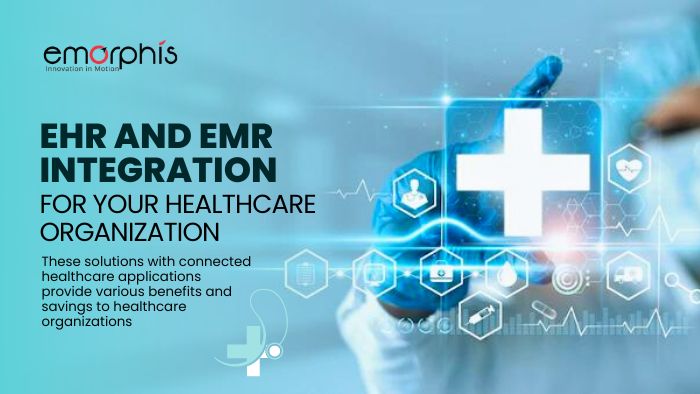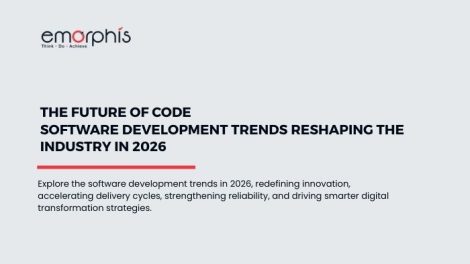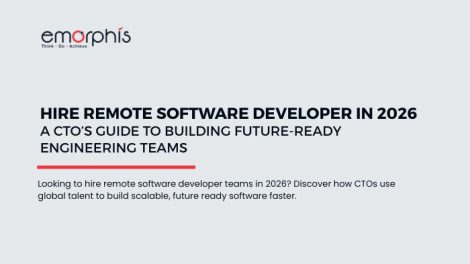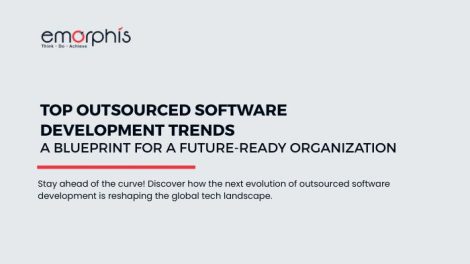The healthcare industry has witnessed a tremendous digital transformation to innovate care delivery & eliminating paper-based clinical practices. To adapt to the technological changes and reform payment & care delivery, EHR & EMR are the most indicative & critical solutions. A report by EHR Intelligence says that almost 93% of American hospitals have adopted EHR & EMR solutions due to increased digital demands. Also, with the newer federal regulations for the digital chart, combined with HIPAA compliance, more and more healthcare organizations now look for EMR or EHR integration for efficient healthcare services.
Healthcare organizations often assume EMR & EHR to be the same, given their basic functionality. Also, the extreme operational healthcare landscape and evolving compliances may lead to more confusion between the two. Let’s try to understand the difference between EMR & EHR to understand which suits best for your organization.
Electronic Health Record (EHR)
As the name says, EHR, Electronic Health Record is the information about specific patients/individuals throughout their medical care journey within an enterprise healthcare system with more than one organization. This information is a collection of records from multiple care centers, hospitals, clinics & also of care, providers, visited by the patient. We can say that an EHR is a comprehensive report of the patient’s overall health.
Electronic Medical Records (EMR)
It is used by a single organization to store information (health, demographics, Medicare policy, payment, etc.) related to a patient, which is at the same time created and accessed by the clinical technicians. As a matter of fact, this data (digital versions of paper charts and records in the clinic) cannot be transferred to multiple practices outside the organization. Also, the information collected is for the medical diagnosis. EMR is the patient’s medical history.
EHR V/S EMR – The Difference
Term EHR and EMR are interchangeable. The primary difference is that EMRs are specific to an organization and cannot be shared; EHRs are shared among organizations. However, there are other key differences enlisted here:
- EHRs are interoperable, as they communicate & collaborate with other systems. The EHRs include documentation, medical records, clinical reporting, diagnosis & result management. EHRs promote the concept of interoperability.
- EHRs are at a higher security stake as they operate within multiple practices. EMRs are considered more secure. The patient data is inaccessible outside the organization.
- One of the most crucial differences is accessibility. EHRs are accessible to patients & care providers while EMRs are not. However, accessibility in EHR also requires data standardization which is possible only through integration.
EHR includes past medical history, vital signs, diagnosis, disease progress notes, medication, immunization dates, histopathology data, also radio diagnostic reports, and allergy details. It may also include data imported from personal health devices, insurance details, and demographic data. EHR is vital for the healthcare ecosystem because EHR provides critical data that can help coordinate care between all healthcare providers.
EMR is an electronic record such as medical history, diagnosis, medication, allergies, and immunization schedule. EMR is only for medical practices, as the EMR is usually not shared beyond practices. The medical record is sometimes printed and is sent/mailed to another service provider. The record used for diagnosis and treatment is a digital version of the chart.
Importance of EHR For Healthcare Organizations
EHR gives collective data of the patients to the healthcare organization. It saves time and directs the focus of healthcare takers on patients and treatment. The website healthIT.gov states that 80% of healthcare organizations have improved productivity and efficiency. 75% of health care providers say EHR helps receive lab results quickly and generates e-prescriptions simultaneously. EHR is more patient-centric and a more critical element in the diagnostic and treatment part of healthcare providers.
EHR benefits include:
- Provides easy access to clinical data and facilitates tracking of patient’s health
- It helps in establishing clinical workflow and assists in quick clinical decisions and avoids errors
- Allows patient’s involvement in diagnostic and treatment so that patients can see the treatment record
- EHR helps healthcare providers see health charts, so coordination among specialists can quickly improve patients’ well-being and the organization’s reputation.
- Patient portal added EHR & mobile application facilitates patients to monitor health progress reports remotely.
- With EHR-generated prescriptions, faster availability of medicine through e-Prescription.
- EHR keeps track of patient’s medical history and alerts doctors if any medicine on the prescription is harmful.
As discussed in the previous section EHR promotes interoperability, it is just a piece of the puzzle. With technological advancement, healthcare providers now look to connect with new solutions with healthcare app development such as telemedicine, telehealth, m-Health, wearable devices, remote patient management, etc, that bring all the data & systems from disparate sources together for insights for clinicians. EHR technology solutions provide the base & structure of the medical data and can be easily integrated with other advanced technologies for better healthcare delivery.
EHR integration vendors are playing a crucial role in advancing healthcare interoperability, which is the much-needed scenario of today. Whether it is an in-patient or ambulatory care, EHRs are providing data-driven insights & posing as the future models of advanced healthcare.
Importance of EMR For Healthcare Organizations
Selecthub health research reveals that there is an 89% increase in EMR adoption as a result of the technological boom. As doctors and patients look for more streamlined options to communicate and share information effectively, EMR streamlines all patient data in one place.
An EMR system integration can open various possibilities for your healthcare practice as improved patient-provider coordination is the key to fruitful healthcare delivery. EMR integration is essential as it provides the following benefits to your healthcare organization.
EMR benefits include:
- Access to patient medical records, doctor’s notes, and diagnosis & lab results.
- Easy scheduling of patient appointments
- Patients can also initiate and facilitate telehealth sessions
- Doctors can check prescription lists, mention refills, and also share information with other specialists if needed.
- Enables bi-directional medical device connectivity, operations management, and scaling communication.
- It helps to get a second opinion on a patient’s medical treatment as data can be accessed remotely.
- Allows in-house communication; with a click, staff can see the records. It helps track the medical health trends of patients to take corrective measures in an emergency.
- EMR saves time, is eco-friendly (saves paper), saves space, and reduces medical transport.
As per the research of a business intelligence firm. The EHR market is expected to achieve 38.3 billion USD by 2025. Based on subscriber data, the Hospital EHR market is dominated by 91% by 7-8 giants and 9% by other small healthcare organizations. In using 500 vendors render EHR various services.
In ambulatory EHR, as per the KPMG survey, 73% market is captured by 15 vendors. However, Epic and Allscripts vendors dominate this market.
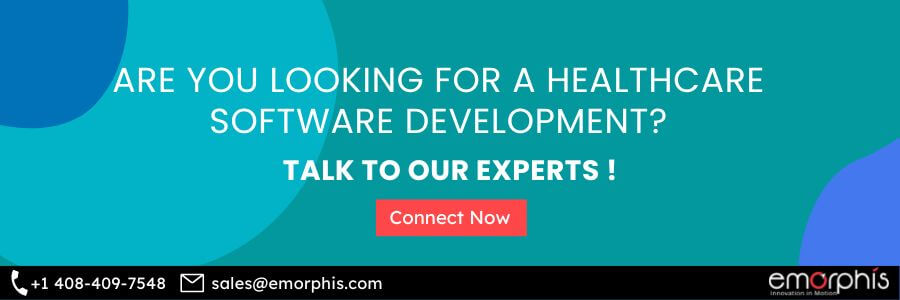
EHR and EMR Integration
Integration means enabling healthcare organizations to improve the quality of care and staff efficiency through data exchange between various EHRs, clinical systems, and other parties’ applications. As a matter of fact, the integration provides easy access to services, reduces hospitalization and readmissions, and improves treatment and patient satisfaction. With increased patient EHR & EMR data, scalable and adaptable integration systems are becoming differentiators in healthcare delivery. Also, integrating EHR & EMR with HIPAA-compliant systems/tools would fundamentally transform your business if you are a healthcare organization looking to automate secure health processes.
Now, let’s check some of the many benefits of EHR and EMR integration services.
EHR and EMR integration benefits include:
- Huge cost savings
- Better coordination between providers
- Improved patient care
- Increased patient participation
- Enhanced productivity & efficiency
Healthcare organizations are in high demand for system integration. For given the requirement of remote patient monitoring or management of chronic diseases, or ease of data access. One such important integration is the Redox Platform Integration solution, which is very much in the eye of healthcare organizations today.
Redox platform integration brings telehealth patients & healthcare providers together. It ingests, processes also, and securely stores healthcare data and offers cloud-based interoperability and real-time bidirectional EHR & EMR data. Redox FHIR API scales workflows with a consistent experience across payers, healthcare providers, and EHR. The platform helps navigate healthcare reviews and consistent processes across new connections. In addition, this HIPAA-compliant solution removes data silos and offers a robust API solution.
Some more about benefits…
EMR/EHR Integration solutions/services are HIPAA, HL7, and ANSI compliant and connect various devices for smooth flow of clinical data, and communication, and also help harmony among systems. Healthcare system integration paves the way for the analytical method to yield clinical reporting and analysis to arrive at the correct medical decision.
EHR/EMR Integration with medical billing shares patient data for patient coverage and claim submission. The healthcare integration solution also supports third-party data receipt and despatch.
In US & Europe, practically every healthcare organization uses integration and interoperability for data recovery, information reclamation, and sending. EMR & EHR integration improves healthcare service outcomes, with enhanced patient satisfaction and compliance with treatment. Redox, Daffodil, Meditech, CARE 360, Practice Fusion, Athenahealth, eClinicalWorks, McKesson, Intersystem, CureMd, NUE MED, Kareo, and Praxis are some major players.
Get in touch for EMR and EHR integration services.
Cost of EHR and EMR Integration
Comprehensive Electronic Medical Records (EMR) software, with full functionality and usefulness, can cost tens of thousands of dollars. It depends on the following:
- Development and style
- Interfaces and integrations
- Implementation
- Regulatory requirements, compliance, and certification
- User interfaces, customization, implementation, and training
The development, design, and functionality of EHRs all have a significant role in their cost. The amount of interfaces and integrations it provides, particularly in relation to other health records systems, has an impact on the cost as well. The adoption of a web-based or locally hosted SaaS approach affects EHR costs too. User interfaces, customization, deployment, and training are all factors in the price of an EHR once it has been chosen by a customer or practice.
The cost of installing an electronic medical records (EMR) system varies according to your requirements, budget, and other factors. If you utilize free or low-cost EMR software, you will have little control over its features and operation. However, for smaller practices that cannot afford the higher expenses of traditional on-premise EMRs or cloud/web-based EMRs, this may be the best alternative.
So, it costs…
According to several studies, the cost of obtaining and establishing an electronic health record (EHR) ranges between $15,000 and $70,000 per practitioner. Costs vary depending on whether you choose on-site or web-based EHR deployment. These are subject to your locations as well. The cost might be different in the areas of implementation with the choice of a development partner and its location.
Cloud/web-based EMRs are gaining popularity since they are less expensive than traditional on-premise EMR solutions. When evaluating your entire cost, you must also consider the price of hardware installation and employee training.
Savings with EHR and EMR Solutions
Electronic Health Records (EHR) and Electronic Medical Records (EMR) solutions have been proven to cut costs, boost patient happiness, and improve care quality. Integrating an EHR system can cut costs in major healthcare organizations. When highly automated EMR systems are used, the savings are even greater.
The cost savings are derived from a number of sources, including:
- Streamlined billing: EHR/EMR systems make it simpler to automate billing, resulting in faster processing times and higher payment accuracy. Reduced mailing expenses derive from the elimination of paper invoices.
- Improved data access: When data is centralized and saved in the cloud, it is easily available to all authorized staff members. This enables doctors and nurses to offer quality care while spending less time searching through files or calling other departments for information.
Benefits of Outsourcing EHR/EMR Integration:
- Quick Deployment: Opting for an integration specialist reduces the deployment time for any interoperability projects. As the vendors/ integration specialists already have the compliant interfaces built for major EHR/EMR products, they can directly link the application interface with the system, completing the task in a few days rather than several weeks taken by an in-house team.
- Access to expertise: Outsourcing integration to vendors provides immediate access to the integration experts. In-house experts are usually familiar with the product of their interest, but the vendors have expertise with all the available solutions in the market; hence developing custom interfaces for multiple departments comes in handy.
- Cost Savings: One of the best benefits of outsourcing integration is that it saves costs on training and hiring in-house teams. Also, training the new team for HL7, HIPAA, and other healthcare-compliant solutions development is expensive. Hence the option to outsource to an expert EHR/EMR integration service provider like Emorphis can assist with significant cost savings.
The Way Forward
The bottom line is EHR & EMR Integration solutions offer significant value to healthcare. If you are individual practice or a multidiscipline healthcare enterprise, integration is the key that is addressing common challenges like:
- Compatibility with legacy systems
- Adoption resistance from staff
- New system impletion cost
- Data privacy
- Data migration & change management
The cost of EHR/EMR implementation could be expensive but with healthcare solution integration outsourcing, healthcare organizations can save considerably.
At Emorphis, we can assist you with an EMR or EHR integration that improvises your healthcare system.
Emorphis Technologies is a healthcare software development and integration services provider company that specializes in custom development and also third-party EMR/EHR system integrations. We have extensive experience with the development and also in customizing of healthcare apps and wearables, with the existing legacy systems to make them work seamlessly for your provider’s practice or healthcare organization needs.
Our healthcare integration services include custom healthcare software development and integration for EMR/EHR solutions, medical app development, telemedicine app development and integration, telehealth app development and integration, and also, wearable app development, medical device integration, and medical device integration. Insurance and pharmaceutical integrations are two further areas of competence.
We have a long-standing history of success in developing custom electronic health records and medical software systems for hospitals, clinics, and providers. Our healthcare software development specialists create custom solutions for hospitals, clinic doctors, or providers to make their work easier every day.
Click on the Let’s Connect button to contact us for EHR/EMR Integration services you need.



